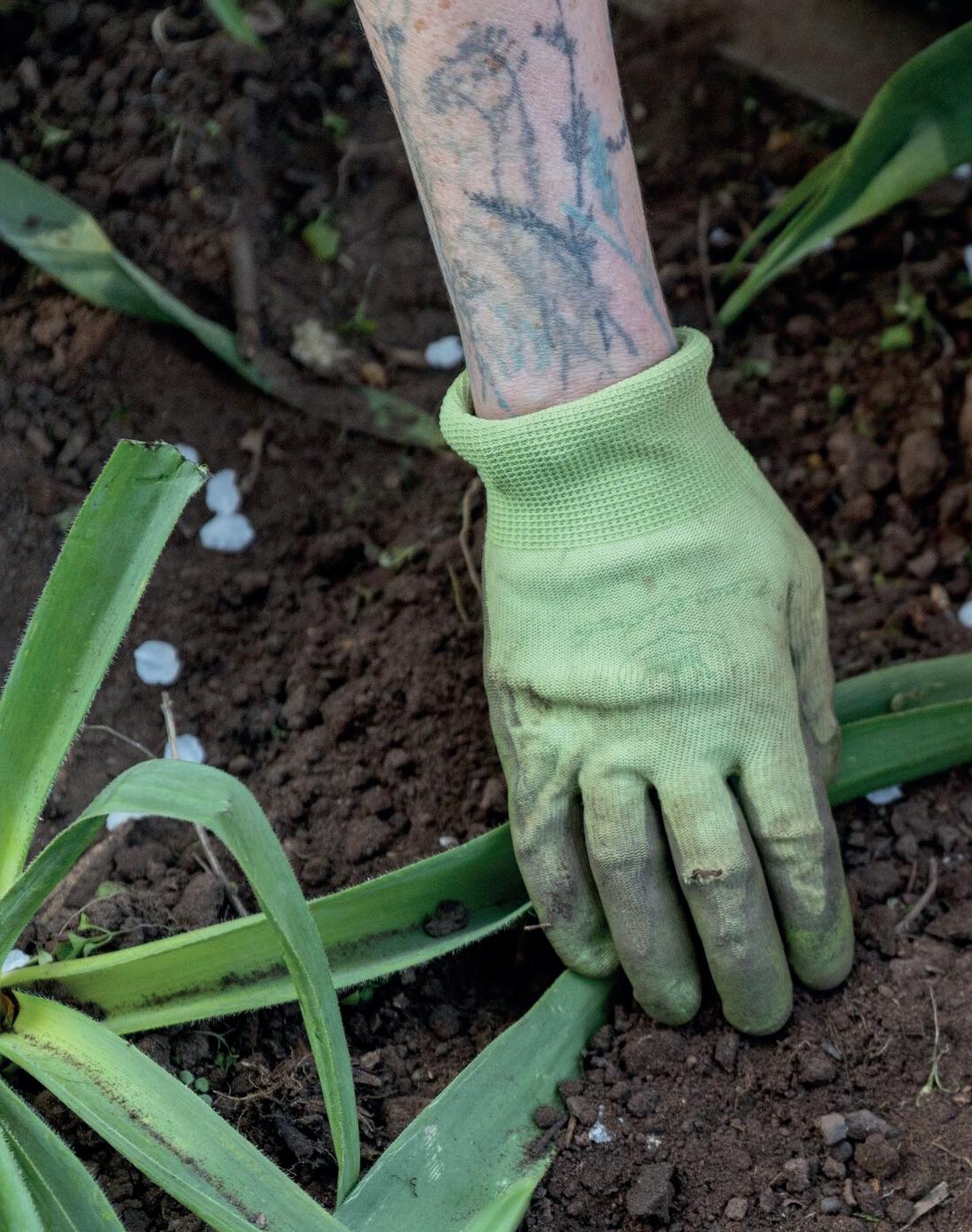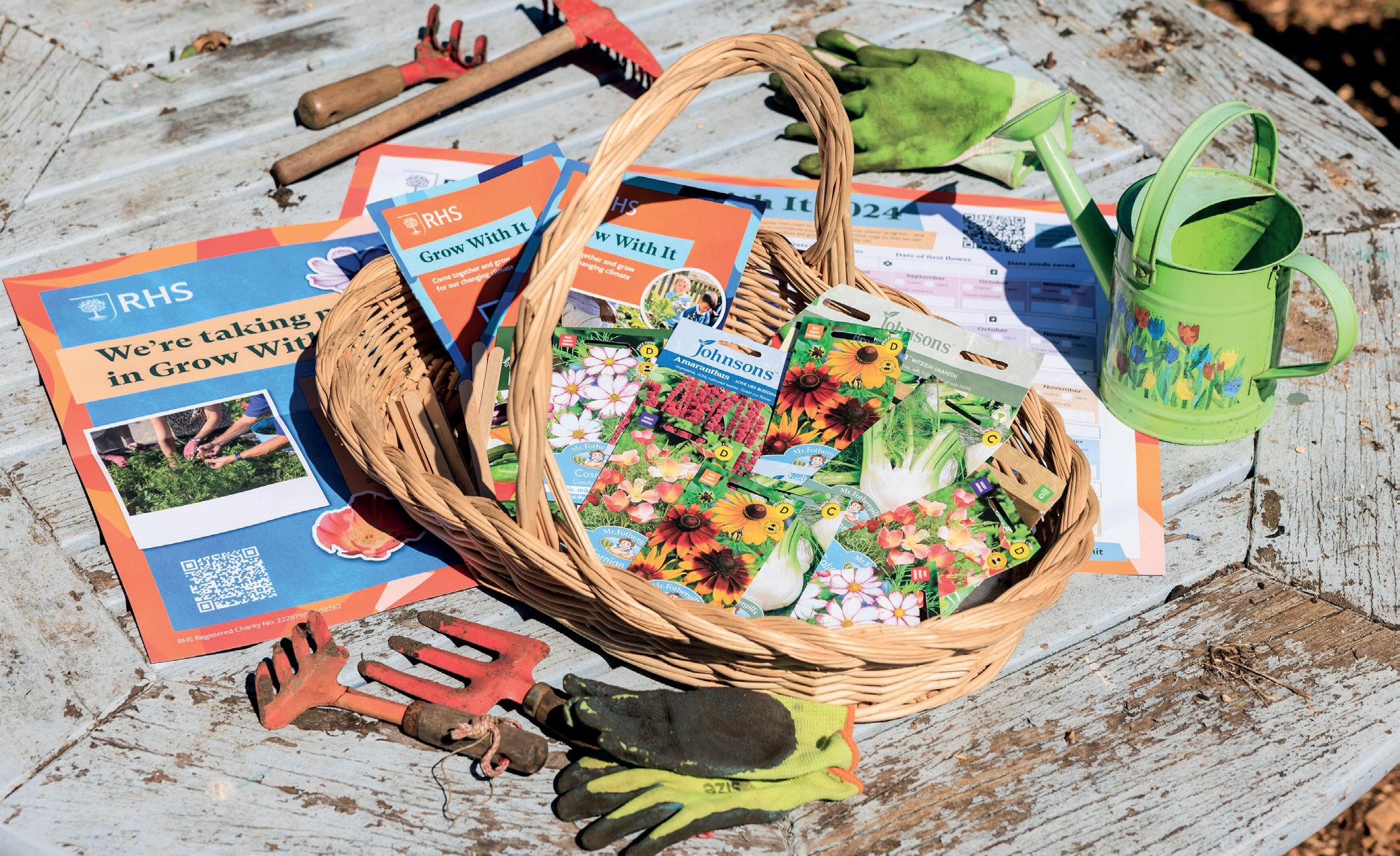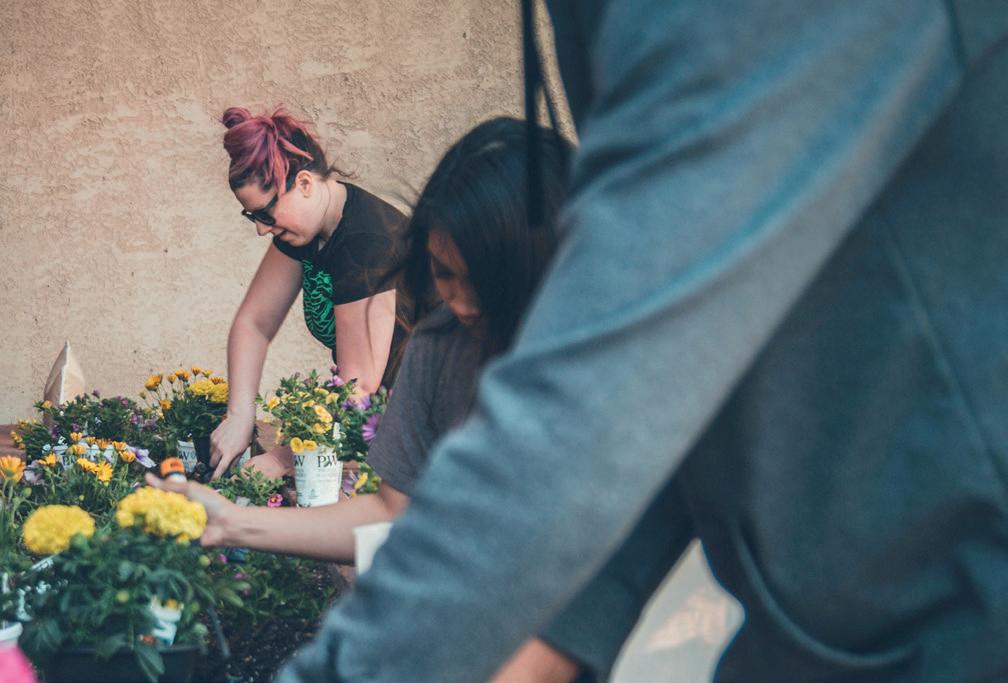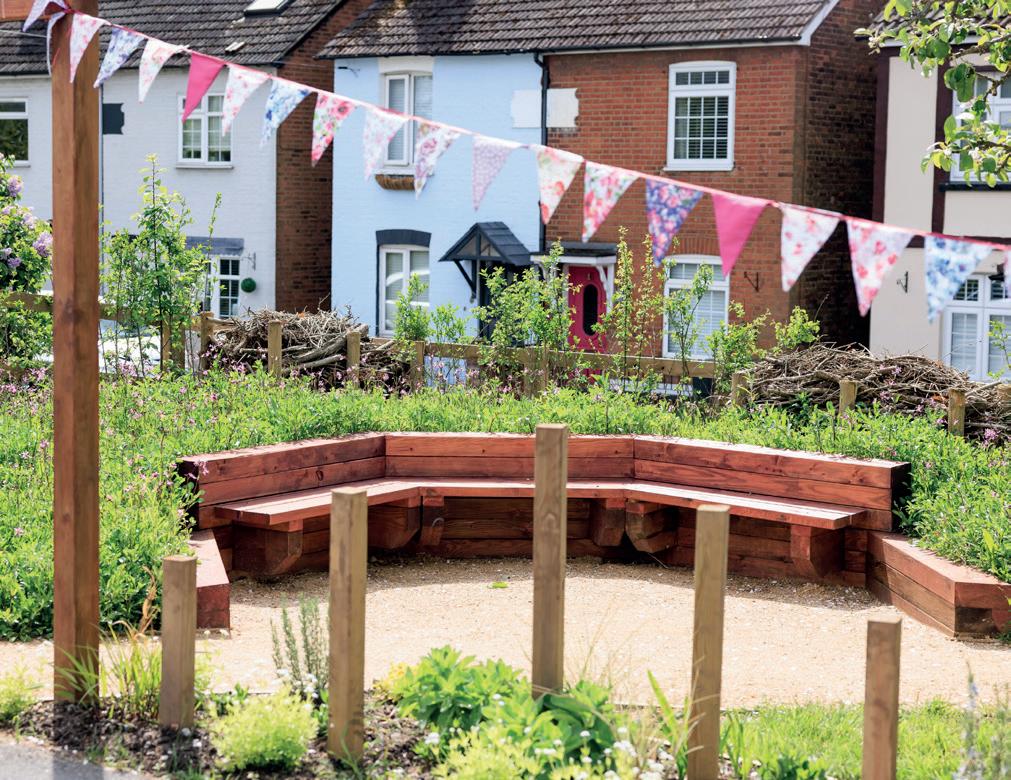Breaking Down Barriers to Heritage and Leisure: Royal Horticultural Society
1. Foreword
Rt Hon Justine Greening, former Secretary of State for Education and Chair of the Purpose Coalition
For many of us, gardening and horticulture are hugely important parts of our lives. Whether growing flowers and vegetables on our balconies and in our gardens or connecting with nature in outdoors spaces, our experiences are often linked to deeply personal memories of family and travel.
Horticulture is also playing an increasing role in addressing national priorities - from climate resilience to community cohesion and from skills development to public health and wellbeing. With the potential to boost social mobility across the country, it should be a sector that offers equal opportunity for everyone, but it is still too often the case that those from traditionally underrepresented groups and lower socioeconomic backgrounds face greater barriers in accessing it.
The wider heritage and leisure sector is an integral part of the UK’s cultural landscape and its broader social and economic fabric. The Purpose Coalition’s Breaking Down Barriers in Heritage and Leisure initiative, which I chair, aims to gather unique perspectives from the sector and develop strategic approaches that will
drive opportunity. Through a series of structured roundtable discussions, we identified examples of best practice across four key elements - outreach, access, recruitment and progression. These are the critical areas where strategic efforts can unlock greater social mobility and widen the talent pipeline.
As the UK’s leading gardening charity, The Royal Horticultural Society (RHS) has a significant role to play in driving change. Committed to extending its impact through career pathways, urban greening initiatives, community engagement programmes and scientific research, the RHS is working to ensure that the benefits of horticulture are available to all, regardless of background, location or ability.
This report demonstrates the wide range of best practice it is already employing in each of the four areas of focus, from its Campaign for School Gardening to its New Shoots initiative. It also identifies where challenges persist - in perceptions of horticulture as undervalued or inaccessiblewith horticulture not recognised as a green career, despite the clear connection between horticulture and the climate and biodiversity crisis- limited training opportunities and structural barriers that restrict entry from disadvantaged backgrounds.
Addressing these issues requires a concerted effort, strategic partnerships and a commitment to transparency and measurable progress and the recommendations outlined in the report offer practical solutions that will help drive sustained, meaningful social impact.
The RHS and the wider heritage and leisure sector have a vital role to play not only in environmental stewardship but in shaping a society where opportunities are genuinely available to all. This report is a significant contribution to that ambition, demonstrating that when institutions commit to genuine inclusion, they don’t simply broaden their reach, they fundamentally enhance their social, economic and environmental impact and community value.
2. Executive Summary
The heritage and leisure sector plays a vital role in both the UK’s cultural landscape and its broader social and economic fabric. From preserving historical assets and fostering national identity to promoting wellbeing and generating tourism revenue, the sector is a cornerstone of the country’s community life and economy.
Heritage and leisure organisations support individuals, families and communities by offering spaces for reflection, learning, professional development and training, recreation and engagement. These organisations safeguard the UK’s rich history and traditions, while also driving local regeneration, skills development and employment, attracting inward investment and strengthening regional pride; in 2023, visitor spending attributable to parks and gardens supported £6.6 billion in GDP. Their role is especially significant as the country faces periods of economic uncertainty and societal change, offering resilience and continuity through culture and connection.
Trust is a central element of the sector’s relationship with the public. Through careful curation, community consultation, and stewardship of cultural heritage, organisations ensure that stories are told accurately and inclusively. This fosters public trust in institutions and promotes a shared sense of identity across generations and communities.
Heritage and leisure sites also contribute significantly to public value. Museums, galleries, theatres, parks and historic landmarks help foster educational engagement and promote physical and mental wellbeing. They also support the wider economy by creating jobs, attracting tourism and encouraging local spending.

The sector is a major employer, encompassing a wide range of professions, from conservators and curators to horticulturists, performers, and visitor experience staff. It offers fulfilling careers to people with diverse skills and passions, and provides opportunities for training, upskilling and lifelong learning that have the potential to address future challenges and needs in the world of work. However, ensuring that opportunities within the heritage and leisure sector are equally accessible to all remains a significant challenge. Individuals from traditionally underrepresented groups and lower socioeconomic backgrounds often face barriers to accessing opportunities in education, training, volunteering and employment within the sector.
The heritage and leisure sector plays a vital role in both the UK’s cultural landscape and its broader social and economic fabric.
Outreach initiatives aimed at widening participation are often concentrated in areas already well-served by cultural infrastructure, leaving behind ‘cultural cold-spots’- regions where engagement with heritage and leisure is limited. Young people in these areas may grow up with little exposure to or understanding of potential careers within the sector.
Work experience and volunteering opportunities, which are often key entry points into heritage and leisure roles, are frequently unpaid or require travel to urban centres, posing financial and logistical barriers for many. This creates a pipeline challenge for the sector, limiting its ability to draw on the full diversity of UK talent.
While many organisations have adopted inclusive recruitment practices, challenges remain. A continued focus on traditional academic qualifications and prior experience can overlook the potential of individuals from non-traditional or marginalised backgrounds. Unconscious bias, a lack of cultural familiarity and rigid institutional cultures further restrict entry and advancement.
Progression within the sector also reveals disparities. Individuals from underrepresented backgrounds may struggle to access mentoring, leadership development or feel included in professional networks. For those with disabilities or neurodivergent needs, a lack of workplace flexibility or understanding can inhibit progression and inclusion.
The nature of heritage and leisure work- often time-sensitive, grant-dependent and reliant on public funding- adds to the challenge of resourcing sustained equity and inclusion initiatives. However, this constraint also provides an opportunity to rethink and redesign practices that embed social impact at the heart of heritage and leisure work.
The Breaking Down Barriers in Heritage and Leisure initiative, chaired by Rt Hon Justine Greening, is working with organisations across the UK to identify and implement bold, practical solutions to unlock opportunity, foster inclusion and ensure the sector reflects and serves the full diversity of the nation.
2.2 About the Royal Horticultural Society (RHS)
The Royal Horticultural Society (RHS) is the UK’s foremost gardening charity, dedicated to enriching lives through gardening and making the UK a greener, more beautiful place. Established in 1804, the RHS has played a pivotal role in shaping horticulture and gardening culture for over two centuries. Through a combination of scientific research, public education, community outreach and celebrated events, the RHS promotes a deeper understanding of the vital relationship between people, plants and the planet.
At the core of the RHS mission is a belief in the power of horticulture to improve health, wellbeing, biodiversity and climate resilience. The charity operates five public gardens across England - RHS Garden Wisley, Rosemoor, Hyde Hall, Harlow Carr, and Bridgewater- each serving as a living showcase of horticultural excellence and sustainability.
These gardens also provide hands-on learning opportunities and act as community hubs for education, professional development, training, work-based learning, volunteering and engagement.
The RHS also champions horticultural science education and professional training through its world-renowned library and Lindley Collections, research facilities and extensive schools and adult education programs. It plays a central role in cultivating the next generation of gardeners and horticulturists through accredited training and qualifications, apprenticeships and career pathways, playing a vital role in green skills development.
Its flagship shows, including the RHS Chelsea Flower Show and RHS Hampton Court Palace Garden Festival, draw global attention to innovative design, environmental stewardship and the social value of green spaces.
As the organisation continues to grow, the RHS remains committed to extending its impact. From urban greening initiatives to community gardening support, and from scientific research to breaking down barriers to access and opportunity, the RHS works to ensure that the benefits of horticulture are available to all, regardless of background, location, or ability.
3. Best Practice Roundtable Insights
The Breaking Down Barriers to Heritage and Leisure project, chaired by Rt Hon Justine Greening, shines a light on leading organisations within the sector, with the aim of gathering unique perspectives and developing strategic approaches that will drive opportunity.
The Purpose Coalition has worked closely with leading organisations to explore how the heritage and leisure sectors can take the lead in improving inclusion and social access, helping to embed best practice across the board and widen its impact.
Through a series of structured roundtable discussions, key examples of best practice have been identified, along with the persistent barriers that limit engagement and progression within heritage and leisure. These discussions centred on four thematic pillars - Outreach, Access, Recruitment and Progression - which collectively represent the full journey of an individual seeking to connect with, participate in or build a career in these sectors.
The insights from the roundtables with the Royal Horticultural Society are captured in Section 3 of this report. This section outlines the key barriers that prevent equal opportunity within the RHS, alongside targeted recommendations to remove those barriers. Through this analysis, the project aims to drive meaningful change and make the sector more welcoming and accessible to all.
Equally important is the wealth of existing good practice already underway among participating organisations. Section 3 also showcases a range of RHS best practice and initiatives that illustrate the steps being taken to promote inclusion, broaden outreach and improve the experience of those engaging with heritage and leisure.
3.1 Outreach
Outreach sits at the heart of the Royal Horticultural Society’s efforts to create a more equitable and accessible heritage and leisure sector. By connecting with individuals at key moments in their educational and personal and professional development, the RHS seeks to break down barriers, spark interest in the natural environment and promote the breadth of opportunities that exist within horticulture and land-based industries.
Central to this mission is ensuring that young people from all backgrounds, particularly those from underrepresented communities, are introduced to the benefits of gardening and outdoor learning at the earliest possible stage.
Strategic outreach by the RHS is designed not only to promote awareness of the organisation itself, but also to shift perceptions of horticulture as a sector, helping individuals understand its critical role in future green careers, environmental stewardship and wellbeing.
A widening skills gap, alongside the pressing need for green solutions in a changing climate, means that increasing the accessibility and inclusivity of horticulture is no longer optional, but essential. RHS outreach aims to address this by engaging the early talent pipeline, empowering schools and communities and building the digital infrastructure to make lifelong learning in horticulture accessible to all.
3.1.1 School Outreach
Early engagement with schools is a cornerstone of RHS outreach. The organisation’s long-running Campaign for School Gardening, launched in 2007, supports over half of all schools across the UK. It offers free resources and professional development tools to help teachers integrate gardening and outdoor learning into their everyday practice, from Early Years through to Key Stage 4.
The campaign seeks to normalise time spent outdoors, improve mental wellbeing and foster a sense of environmental stewardship among young people. The RHS encourages schools to visit its gardens, providing learning experiences on site and offering travel grants to reduce financial barriers to participation.
The School Gardening Awards provide a progressive framework through which schools can demonstrate impact, with students and teachers collaboratively submitting evidenceof their gardening work and development through levels 1 to 5.
The RHS is also a core delivery partner in the National Education Nature Park, a Department for Education–funded programme running until 2027 in partnership with the Natural History Museum. This initiative encourages schools and colleges, from Early Years to Further Education, to improve biodiversity on their estates while integrating environmental action into the curriculum.
In every case, the RHS’s school outreach is grounded in a deep understanding of the challenges that educators face. With time, funding and staffing all in limited supply, RHS support is designed to be flexible and adaptable to individual school priorities.
A key area of advocacy for the RHS is the integration of horticulture into the national curriculum, ensuring that every child has equitable access to nature-based education and the green skills of the future.
A key area of advocacy for the RHS is the integration of horticulture into the national curriculum
3.1.2 Community Engagement
The RHS’s outreach work engages the UK’s growing network of over 20,000 community gardens. Currently working directly with 5,000 gardens and aiming to reach 15,000 by 2030, the RHS is scaling up its support through national partnerships, collaborative networks and targeted grassroots engagement.
Community gardens often operate with limited resources; fewer than one third have paid staff and formal qualifications are rarely required. To better understand their needs, the RHS surveyed around 2,000 community garden groups and uses this data to shape its outreach approach.
A dedicated RHS outreach team, comprised of approximately fifteen Level 2–trained horticulturists with expertise in community engagement, provides direct, targeted support. Using the Index of Multiple Deprivation (IMD), the team prioritises help for the gardens and groups in greatest need.
Programmes such as It’s Your Neighbourhood and Britain in Bloom combine mentoring, capacity building and community celebration. These initiatives are not only about improving green spaces, but also about enhancing the social fabric of communities, increasing wellbeing and fostering local pride.
The RHS also works in partnership with public bodies, including the NHS, prisons and housing associations, to revitalise outdoor spaces and embed nature into institutional life, and is currently working to refine and enhance its community offer based on the responses to its community gardening survey.
In community settings, gardens are increasingly asked to serve as hubs for individuals with moderate and complex needs.
3.1.3 Adult Learning
The RHS offers a broad and inclusive approach to adult learning, catering to everyone from casual gardeners to those considering a professional pathway into horticulture.
Initiatives such as Wild About Gardens, delivered in partnership with The Wildlife Trusts, aim to raise awareness about gardening for wildlife, while the Grow With It programme opens up digital learning for anyone with an interest in gardening, regardless of space or experience. These schemes reduce barriers to access, offering flexible, online support for individuals across the UK.
3.1.4 Challenges
Despite the reach and impact of RHS outreach initiatives, several challenges remain in achieving systemic, equitable change.
Targeting support effectively remains a key concern. Understanding the demographics and needs of individuals entering the horticultural talent pipeline is complex. The RHS is actively considering how best to measure social impact and focus its efforts, whether addressing social isolation, developing green skills, or improving biodiversity.
In community settings, gardens are increasingly asked to serve as hubs for individuals with moderate and complex needs. This expansion of service demands calls for upskilling, professional standards and increased funding, none of which can be delivered without strategic support from both the wider sector and government.
Within schools, resource constraints can limit participation. Many lack the time, funding or staff capacity to integrate gardening into daily life. The RHS is therefore advocating for curriculum-level integration and supporting schools with adaptable, low-burden resources.
Finally, public understanding of horticulture remains a hurdle. Despite its relevance to climate change, wellbeing and the green economy, horticulture is not yet officially recognised as a green career. This limits both funding and strategic support. Changing perceptions of the sector and clearly articulating its future relevance will be vital if the RHS and others are to attract the diverse, skilled workforce that the heritage and leisure sector requires.
3.2 Access
Creating equitable access to careers in the heritage and leisure sector is a key focus of the Royal Horticultural Society’s (RHS) work to open up opportunity. As the sector plays an increasingly important role in national priorities such as wellbeing, community cohesion and environmental sustainability, ensuring that people from all backgrounds can engage with and contribute to horticulture is more essential than ever.
Through a wide range of work experience opportunities, professional training programmes, apprenticeships and targeted initiatives, the RHS is working to support those interested in joining the sector, including those from underrepresented or disadvantaged backgrounds, by removing barriers and creating more inclusive entry points into horticultural careers.
Opportunities to access the sector must be embedded across multiple life stages, recognising that individuals enter or re-enter the sector from school, university or later in life. The RHS’s 2030 strategy acknowledges the need for a lifelong relationship with gardens and horticulture. As such, access pathways are intentionally designed to be flexible, responsive and inclusive.
3.2.1 Work Experience and Placements
Work experience is a vital step in helping individuals gain confidence, insight and practical exposure to careers in horticulture. The RHS offers a suite of opportunities aimed at learners of all ages and stages, from school-aged students to career changers.
Voluntary work experience placements are available for up to one week for both young people and adults. These placements provide meaningful on-the-ground experience and are designed to help individuals assess their interest in pursuing a horticultural career.
The RHS also runs professional one-year work placements for individuals who already hold a horticultural qualification and have practical experience. These placements are paid at or above the National Living Wage and provide trainees with the opportunity to develop their skills in a real-world context, preparing them for long-term employment within the sector.
Supporting these placements are the RHS’s own qualifications programmes, ranging from Levels 1 to 3 and culminating in the prestigious Master of Horticulture. Delivered via a network of around sixty approved centres across the UK, these qualifications offer flexible learning pathways that can be completed part-time, online, onsite or through blended formats. This approach is designed to make horticultural education as accessible and inclusive as possible, especially for those balancing other life commitments.
The New Shoots programme represents a flagship initiative in widening access to horticultural careers. With a focus on increasing representation across socioeconomic and geographical lines, the programme provides taster sessions, careers advice and guidance on horticultural career pathways. It is designed to act as a stepping stone from education to employment, at a time when the horticultural industry is poised to play a vital role in the UK’s transition to net zero. The accompanying New Shoots Scholarship further supports participants by covering financial costs associated with training.
Furthermore, the New Shoots Internship, based at the RHS Wisley site, runs for a total of 30 days between April and October, paying the National Living Wage. Participants have the flexibility to complete the internship either in blocks or one day per week, ensuring accessibility regardless of existing commitments.
In addition, the RHS is piloting a youth volunteering scheme for school leavers and university students, as well as running a green skills Saturday programme, which delivers monthly practical sessions to explore career opportunities in horticulture.
These programmes attract a broad demographic and are designed to meet the needs of the wide range of people wishing to learn more about a career in horticulture. In 2024, 63% of participants in RHS’ School of Horticulture were career changers, highlighting the need for a non-linear, inclusive approach to access that meets the requirements of people at various life stages.
3.2.2 Apprenticeships
RHS apprenticeships provide an essential alternative route into the horticultural sector, especially for young people who may not wish to follow a university pathway. These structured programmes, which are paid at the National Living Wage, require no formal qualifications and offer a two- to three-year full-time contract, combining hands-on work in RHS gardens with formal learning through college-based study.
Apprentices rotate through various departments, allowing them to experience the breadth of roles available within the sector, from plant care to visitor engagement, and helping them make informed career decisions.
Importantly, RHS apprenticeships are not limited to horticultural roles. The RHS also offers apprenticeships in business-critical areas such as IT, ensuring that opportunities are available to young people with a wide range of interests and aptitudes.
3.2.3 Challenges
Despite this wide range of initiatives, the RHS, and the horticultural sector more broadly, continues to face challenges in widening access.
One persistent barrier is the perception that horticulture is a voluntary or low-paid sector. Many roles, particularly in community gardens, are underpaid, limiting access for individuals from lower socioeconomic backgrounds. Financial insecurity can prevent talented individuals from entering or remaining in the sector, which reinforces inequality.
The RHS’ position as a charity also presents challenges with resources and capacity. Designing and delivering high-quality programmes that create meaningful change requires time, specialist knowledge and sustained commitment- resources that can be limited within charitable organisations which face a multitude of demands.
Reaching underrepresented groups is another key challenge. Aside from LinkedIn, the RHS currently
does not widely use social media to advertise vacancies, potentially limiting its reach among younger or more digitally-connected audiences.
There are also significant structural inequalities around access to green space. 9.6 million people in the UK are deprived of access to green space, with people from ethnic minority backgrounds twice as likely to live in areas with minimal access. These inequalities underline the need for targeted interventions that bring opportunities into urban communities and engage individuals who may not have traditional exposure to horticulture.
Finally, the sector’s lack of visible diversity remains a critical issue. Individuals from underrepresented groups often do not see themselves reflected in the industry, which can contribute to feelings of exclusion or hesitancy in pursuing a horticultural career. The RHS recognises that fostering a sense of belonging, through diverse role models, inclusive environments and welcoming language, is essential for long-term cultural change.
3.3.1 Inclusive Recruitment Processes
The RHS has embedded simplicity and clarity into the structure of its recruitment process. Candidates apply through an online system, submitting a CV and supporting statement, which are then reviewed by hiring managers. While this is a standard model, continuous efforts are made to ensure that every step of the process is user-friendly and inclusive.
One of the defining features of RHS recruitment for professional programmes such as the New Shoots scheme is flexibility. The programme has no strict entry criteria, which allows for greater responsiveness to individual potential rather than prescriptive qualifications. This approach supports applicants who may not have followed traditional education or employment paths and opens doors to those with non-linear journeys into horticulture.
3.3.2 Support for Hiring Managers
Recognising that many line managers within the organisation may only occasionally recruit and so might lack up-to-date training on inclusive hiring, the RHS offers tailored advice and support to ensure a consistent and fair approach. This includes guidance on the recruitment steps to follow, with an emphasis on maintaining high standards of equity and consistency across the organisation.
Recruiters are also encouraged to adopt a mindset that values potential over perfection. This includes being open-minded about how a candidate might meet the needs of a role, rather than adhering too rigidly to a predefined list of attributes or qualifications. This values-based approach not only widens the talent pool, but helps to attract individuals who are aligned with the RHS’ mission and values, even if they come from non-traditional backgrounds.
3.3 Recruitment
Ensuring equality of opportunity in the heritage and leisure sector begins with implementing fair, transparent and inclusive recruitment processes. At the Royal Horticultural Society (RHS), a significant focus has been placed on breaking down the structural and cultural barriers that can prevent individuals, particularly those from underrepresented backgrounds, from entering and thriving in the sector.
As part of its broader inclusion work, the RHS has made a clear commitment to shaping a workforce that reflects the diversity of the UK. Creating accessible, thoughtful recruitment practices not only allows the organisation to reach a wider and more representative talent pool but also strengthens its ability to serve communities across the country through diverse perspectives and lived experiences.
Recruitment at the RHS is approached as an evolving practice. It is not solely about filling vacancies quickly, but about ensuring that every candidate, regardless of background, disability or socioeconomic status, has a fair opportunity to succeed.
3.3.3 Reasonable Adjustments and Candidate Support
The RHS has taken active steps to accommodate candidates who may require additional support during the recruitment process. Candidates are invited at the application stage to suggest any reasonable adjustments they may need, such as being provided with interview questions in advance, to ensure they can participate on an equal footing with other applicants.
However, the RHS is working to go beyond simply responding to requests for adjustments. The vision is to embed inclusive design principles throughout the recruitment system so that accommodations are built in by default. This proactive approach aims to minimise the burden on candidates to disclose or request accommodations, recognising that many individuals are reluctant to do so out of fear that it may impact their chances of being hired.
3.3.4 Challenges
Recruitment within the heritage and leisure sector, and particularly within charities like the RHS, presents several systemic barriers to access. One of the most significant is pay; the sector often requires highly skilled professionals but is unable to offer salaries that are competitive with those in the private sector. This disproportionately affects candidates from lower socioeconomic backgrounds, who may be unable to accept roles with lower remuneration, despite having the necessary skills and passion.
In addition, unconscious bias and a lack of inclusive hiring knowledge among occasional recruiters can hinder efforts to make fair decisions. The RHS is aware of the risks posed when hiring responsibilities fall to individual managers who may not be familiar with inclusive recruitment practices or who have not had recent training. This highlights the need for consistent institutional support, education and accountability across the organisation.
Recruitment within the heritage and leisure sector, and particularly within charities like the RHS, presents several systemic barriers to access. One of the most significant is pay
In a competitive job market and with operational pressures to fill roles quickly, there is an understandable tendency to favour ‘job-ready’ candidates. However, the RHS is increasingly aware of the importance of investing time and effort into supporting candidates who may require initial guidance but can offer great long-term potential.
Accessibility remains a key area of focus. Currently, the RHS recruitment platform cannot be used on mobile phones, requiring candidates to have access to a computer- something that may disproportionately impact applicants from lower-income households. The RHS recognises this challenge and acknowledges the need for future system improvements that accommodate all users regardless of their access to technology.
3.4 Progression
Supporting individuals from underrepresented backgrounds to enter the heritage and leisure sector is only the first step in addressing structural inequality. For true equity to be achieved, organisations must also ensure that everyone who joins has a fair chance to thrive and succeed throughout their career. Within the horticultural sector, and at the Royal Horticultural Society (RHS) in particular, ensuring accessible and equitable progression pathways is central to unlocking the full potential of the talent pipeline.
Progression must be possible without individuals feeling pressured to conform to dominant social or cultural norms. The sector as a whole must reflect on how to support individuals to progress in their careers while remaining authentic to their identities and backgrounds. Doing so is vital not just for personal growth and career satisfaction, but also for cultivating leadership teams that reflect the diversity of society.
Transparent criteria for advancement, alongside the availability of development tools and networks, are crucial to ensuring all employees can see how to move forward in their careers. People need clarity about what is expected of them and reassurance that these expectations are applied fairly and consistently.
3.4.1 Learning and Development
The RHS is committed to equipping its staff with the tools they need to develop professionally. All new starters take part in a structured induction process that includes e-learning, a dedicated induction day and a buddying system to support a smooth transition into the organisation. New employees spend time with various teams, engage in roundtable discussions about the RHS’s work and begin to build internal networks from day one.
Beyond induction, the RHS offers a broad learning and development programme. Staff can access training via an online learning platform as well as through in-person sessions covering subjects from health and safety to interpersonal skills.
Crucially, the RHS encourages personal ownership of development by maintaining a personal development menu, used for performance reviews to help identify individual growth areas and relevant learning opportunities. Support with giving and receiving feedback, resilience training and peer-topeer learning sessions are just some of the resources on offer. Employees are also able to propose external training relevant to their roles, ensuring that development remains meaningful and tailored. This open, flexible approach empowers staff to shape their own development journeys while maintaining alignment with the organisation’s expectations.
To provide greater clarity and consistency, the RHS is currently developing a formal progression framework. This will outline clear routes to advancement and set out the responsibilities and behaviours expected at different levels, helping to embed fairness and transparency in career development across the organisation.
3.4.2 Leadership
The RHS recognises that structured leadership development is key to progression, especially for those moving into or currently occupying management roles. Its Aspiring Managers Academy supports staff who have shown leadership potential or expressed interest in progressing into management, offering training in essential areas such as recruitment and performance management.
For those already in management and leadership roles, the Growing Managers’ Academy and the Growing Leaders’ Academy support continuous development. The Growing Managers’ Academy is a modular programme that commences with a one-day Purpose & Principles workshop, with
delegates then spending up to a year progressing through various modules. The Growing Leaders’ Academy is a three-day programme that includes mentoring and coaching components, with the aim of equipping leaders with the skills to create inclusive, high-performing teams where all individuals can thrive.
In addition to the academies, the RHS offers informal coaching and is exploring the introduction of a formal mentoring scheme. Particular focus is being given to ensuring mentoring is accessible to those from underrepresented groups, including through the development of mentoring circles that bring together aspiring leaders and senior staff for peer learning and career guidance.
3.4.4 Challenges
The RHS acknowledges the challenges that persist in supporting progression in horticulture. One significant barrier is the limited availability of horticultural training beyond Level 3. Career pathways can be constrained by the sector’s structure - many teams are small and roles are often static, making upward progression difficult.
High retention rates further compound this issue, leaving limited room for advancement even when individuals are ready to take the next step. Additionally, there is a notable gap in the sector between those with horticultural expertise and those with leadership or management experience, limiting the pool of candidates equipped to take on more senior roles.
A lack of collaboration across the horticultural industry also hampers the sharing of best practice and prevents individuals from accessing learning opportunities outside their own organisations.
The challenge of representation remains pressing - only 5% of RHS staff currently come from ethnic minority backgrounds. This underlines the need for a connected approach across all stages of the talent pipeline, from attraction and recruitment to retention and progression. Without ensuring inclusion at each stage, efforts to diversify leadership will remain a challenge for the horticultural industry as a whole.
3.4.3 Fostering an Inclusive Culture
A progression system that works for everyone must be underpinned by an inclusive workplace culture. The RHS supports a range of internal inclusion networks, including groups for LGBTQ+ colleagues and those with neurodivergence. These networks play a crucial role in making staff feel welcomed, accepted and able to be themselves at work. They also work to dismantle outdated cultural norms within horticulture, promoting visibility for underrepresented groups.
The organisation has taken active steps to better understand its workforce by collecting data on socioeconomic background, ethnicity and gender. This evidence base is helping to identify and address potential barriers to progression. Future plans involve further analysis of this data to pinpoint where inequalities may persist and to shape targeted interventions.
The RHS supports a range of internal inclusion networks
As a founding partner in the Access All Areas Charter, a cross-sector collaboration aimed at improving diversity in horticulture, the RHS is also working beyond its own walls to share learning and promote change across the wider sector.
4. Recommendations
The insights shared by the Royal Horticultural Society (RHS) during the Breaking Down Barriers to Heritage and Leisure roundtables have been gathered by This is Purpose to put together a range of strategic recommendations designed to support the RHS in driving its social impact agenda forward even further.
Recommendations covering each of the four roundtable focus areas - outreach, access, recruitment and progression - are outlined in this section to provide the RHS with a range of impactful measures to consider in their efforts to create greater equality of opportunity within the horticulture and heritage professions.
Outreach
• Attraction of the heritage sector to a more diverse talent pool continues to be a significant challenge. To deepen its understanding of this issue and engage young people more effectively, the RHS should consider working further with This is Purpose to host dedicated Purpose Lab sessions. These sessions, which bring together university and college students to co-create responsible business strategies and social impact solutions, offer a unique opportunity for the RHS to engage with young people at the early stages of the talent pipeline. Participation in these sessions would enable the RHS to gain valuable insight into the barriers that deter young people from considering careers in horticulture and heritage, while simultaneously offering the opportunity to address common misconceptions about the sector and strengthening its relevance among future talent.
• In addition to engaging directly with students, the RHS should work with the Purpose Coalition to raise awareness among policymakers about the exclusion of horticulture from the definition of “green jobs.” This advocacy work could help reposition horticulture as a critical sector in the green economy. It could also be expanded to campaign for horticulture to be embedded into the national curriculum, particularly in light of the fact that many children have limited access to green space. Embedding horticulture education early is key to addressing future skills gaps and preparing the workforce of tomorrow.
Access
• Broadening communication channels is essential for widening access to RHS programmes. The RHS should explore new and more inclusive ways of sharing information, such as leveraging social media platforms and expanding outreach to more varied and non-traditional advertising locations. These steps would help the organisation reach demographics that are typically underrepresented in the sector.
• It is important to acknowledge that the RHS cannot and should not aim to be the expert in every access challenge. Instead, forming partnerships with specialist organisations that already have trusted relationships and proven track records with underrepresented groups will allow the RHS to benefit from external expertise while reducing internal resource strain.
• To further enhance accessibility, the RHS could consider introducing virtual work experience programmes. These initiatives would enable individuals from a broader geographic and socioeconomic base to engage with the sector. Supplementing this alongside existing on-demand learning resources would ensure that people with jobs, caregiving responsibilities or other time constraints can still benefit from these opportunities, creating a more level playing field across different backgrounds.
Progression
• Progression within the sector requires longterm investment. The RHS should explore the development of a cross-sector leadership programme in collaboration with other heritage and horticultural organisations. Such a programme would offer skilled horticultural professionals the opportunity to build leadership and management competencies, ensuring that technical expertise can translate into organisational influence.
• The RHS should also continue to build on its current efforts to collect and analyse data on ethnicity, gender and socioeconomic background. This data is crucial in building an accurate picture of employee progression and identifying any systemic barriers faced by specific groups. However, to ensure high levels of engagement and trust, a strong internal education campaign should accompany data collection efforts. Staff must understand how their data will be used to create a more inclusive and equitable organisation and feel confident in the transparency and intention behind these initiatives.
Recruitment
• A consistent and strategic approach to recruitment is essential. The RHS should consider investing in a dedicated recruitment team tasked with implementing organisation-wide recruitment initiatives. This team would be responsible for embedding best practices and ensuring a standardised, inclusive approach across all departments.
• To strengthen inclusive hiring practices, the RHS should prioritise the ongoing training of hiring managers and decision-makers. Regular sessions highlighting the value and impact of inclusive recruitment will help embed these practices across the organisation and drive meaningful cultural change.
• Given the accessibility challenges posed by a desktop-only application system, the RHS should prioritise the development of a mobile-friendly recruitment platform. This would ensure that applicants without reliable access to computers are not excluded, particularly benefitting younger applicants or those from lower socioeconomic backgrounds.
• The RHS can also contribute to the wider sector talent pool by offering constructive feedback to unsuccessful candidates. This feedback loop not only aids the personal development of candidates who may apply again in the future but also supports the broader goal of strengthening the horticulture workforce overall.
To strengthen inclusive hiring practices, the RHS should prioritise the ongoing training of hiring managers and decision-makers.
The Purpose Coalition campaign is proudly run by This is Purpose, part of Crowne Associates.
Copyright © 2025. Crowne Associated Ltd is a corporate affiliate member of the Chartered Institute of Public Relations, and reports lobbying activities to The Office of the Registrar of Consultant Lobbyists, in line with the Transparency of Lobbying, Non-Party Campaigning and Trade Union Administration Act 2014. You can read our Code of Conduct at crowneassociates.uk/code-of-conduct

















